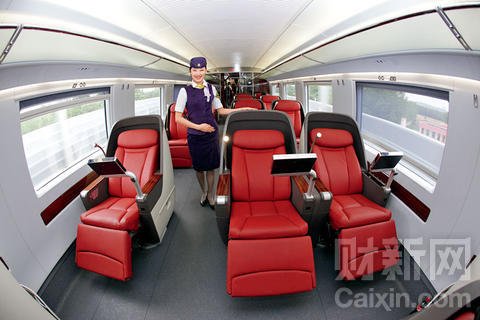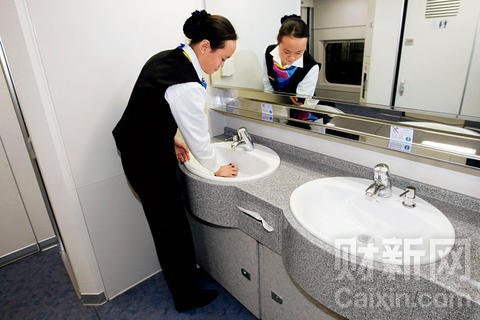
China tests its high-speed rail link from Beijing to Shanghai on June 16, 2011.

An attendant is cleaning the washroom of a bullet train on the Beijing-Shanghai rail link on December 21, 2008.
(Ecns.cn)--China's troubled high-speed rail system has come under the spotlight again with media reports claiming that equipment used onboard trains was bought for prices much higher than market rates.
"A washroom costs about 300,000-400,000 yuan (US$47,625-63,500), an LCD TV over 10,000 yuan (US$1,588), a single seat 22,000 yuan (US$3,493), and a showcase 68,000 yuan (US$10,795)," reported Century Weekly magazine Tuesday on the "luxury" equipment used in China's bullet trains.
The magazine quoted a purchase list of the China South Locomotive & Rolling Stock Corporation (CSR), revealing that many of the more than 3,000 items on the widely-used CRH2 trains, such as seats and washstands, were priced several times higher than the average retail cost.
The washstand, according to the magazine, usually sells for 3,000 yuan (US$476) per linear meter at Beijing's Easyhome (a home improvement store similar to Home Depot),while CSR bought a two-linear meter one for 26,096 yuan, nearly four times the market price.
The magazine added that the cost of a double seat was about 40,000 yuan (US$6,350) and a VIP seat as high as 160,000 yuan (US$25,400), yet it found similar products from other manufacturers for about a third less.
As China's bullet trains have been the subject of a series of scandals--some of which are still under investigation--the inflated figures hint at behind-the-scenes deals involving corrupt transactions, suggested the Shanghai Daily.
The newspaper alleged that high-ranking railway officials set prices and then selected specific suppliers that they were connected to or helped with their bids.
Moreover, the suppliers that won bids to provide train seats "were seldom heard of before," said the report.
Shanghai Tanda Railway Vehicle Seat System Co. Ltd., which was established in 2004 with registered capital of 10 million yuan, is one of the suppliers. Ding Xinning, a former official at the National Development and Reform Commission, serves as its board chairman and general manager.
"Shanghai Tanda was specially set up to produce seats for bullet trains," pointed out an unnamed company insider. "The company was created after they won the bid to provide seats."
Similarly, Shanghai Yuan Tong Seating System Co. Ltd, a "sworn enemy" of Tanda, is also a major seat supplier, which has mainly focused on the 160,000-yuan VIP seats.
Insiders told Century Weekly that the companies had "a strong background and guanxi, or connections, in the industry."
But when equipment was found to be broken or worn out soon after it was put into use, according to a CSR spokesman, the suppliers acted "cold and indifferent."
A thorough investigation by the magazine showed that a legal representative of Shanghai Tanda named Zhang Xiaoqi and the company's sole shareholder Hou Jinliang have connections with Ding Shumiao, a businesswoman in Shanxi Province who bribed officials to prioritize train equipment contracts. Ding was reportedly introduced to the senior managers of the company in 2006.
Liu Zhijun, the former head of the state railway administration, was said to have taken bribes from Ding, which led to his sacking amid a graft probe last year.
Both companies, the Century Weekly added, had previously been losing money, but started earning high profits after the bullet trains went into service.
The two companies practiced "predatory monopolization," said industry insiders, who explained that many bosses of similar companies are relatives of officials at the railway administration.
Even if the companies are not competent or innovative, the train manufacturers dare not replace them because of their privileged backgrounds.
The Ministry of Railways (MOR) is the "initiator of the evil," commented the magazine, speaking of the market monopolization of supplies for high-speed trains.
When choosing suppliers, the MOR gave out posts on grounds of personal favor instead of selecting by merit, noted Century Weekly, adding that among the three bidders for seat supplies back in 2004, Shanghai Tanda was in fact the youngest and most inexperienced.
"The items themselves were not as expensive as they were priced. It was the corruption in the bidding that pushed the prices up," noted a netizen.
"The sky-high prices were created by men, which was a breach of market discipline, and should be punished by law," said another.
In the end, it is the public who pays the price, by buying train tickets ranging from 550 to 1,750 yuan (US$87 to 278), a web user named Zhang Guifeng pointed out.

Copyright ©1999-2011 Chinanews.com. All rights reserved.
Reproduction in whole or in part without permission is prohibited.